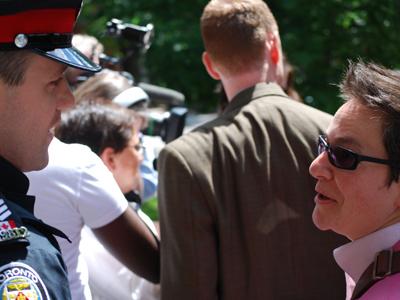City staff will likely wait for the findings of the Pride Community Advisory Panel (CAP) before telling city council whether or not the group Queers Against Israeli Apartheid (QuAIA) violates the city’s anti-discrimination policy.
A July 6 city council motion to defund Pride Toronto directs city managers to determine whether QuAIA’s presence in the Toronto Pride parade violates the policy. If the city managers determine that it does, Pride Toronto would be ineligible for city funding. There is nothing in Canadian jurisprudence to suggest that criticism of government, foreign or domestic, is discriminatory. But many in the Jewish community believe that the phrase “Israeli apartheid” is anti-Semitic.
QuAIA members, including Elle Flanders and Tim McCaskell, met with city manager Joseph Pennachetti on Nov 29 in a bid to convince Pennachetti that QuAIA does not violate the city’s policy.
“This is a decision that councillors have punted over to city staff,” says Flanders. “And no one wants to make this decision because no laws have been broken.”
McCaskell says the meeting was “interesting,” adding that there were four members of QuAIA there. City staff included Pennachetti, executive director of culture Rita Davies, city lawyer Ward Earle and Mike Williams, general manager of economic development and culture.
McCaskell says Pennachetti talked about the process the city plans to follow in making its determination. Still, says McCaskell, the city is reluctant to give specifics. That may not be entirely surprising, considering the recent municipal election.
“It appears they are waiting to hear from the Community Advisory Panel before they make any recommendations to council as to whether or not we violate city policy,” says McCaskell. “That’s odd because the purpose of the Community Advisory Panel is not to determine that.”
Xtra could not reach Pennachetti for comment, but he clarified his position in an email to McCaskell.
“I did indicate that we want to understand the Pride Community Advisory Panel’s results before finalizing our conclusions and recommendations, as it only makes sense to be aware of all perspectives and consultations before approaching executive committee,” Pennachetti wrote. “In no way, however, are we saying that the Advisory Panel findings will be the ‘basis’ for our recommendations.”
At the ongoing CAP sessions, Flanders has been quick to remind people that city staff will use the information collected in that process. She says the city’s scrutiny of Pride is unheard of for any other city-funded cultural festival or event. The CAP recommendations are expected in late January or early February.
“People who come to the CAP sessions are completely unaware of what happened last year [surrounding QuAIA],” Flanders told Xtra following the Dec 6 CAP session at the University of Toronto. “The panel needs to be aware of this and talk about it. People at the panels need to talk about this. That’s my insistence in bringing it up at these meetings.”
McCaskell says Pennachetti plans to report to the city executive committee, likely in April. Pride is in early July.
“I think they will be hard-pressed to find we’ve broken any city policy,” McCaskell says. “Anyone with an understanding of equity issues would understand that. But who knows, I think [city staff] are scared of council, scared of the new administration, and they see themselves as squeezed.
“I just hope that the Community Advisory Panel takes this off their hands somehow, so they don’t have to make a decision they know they can’t uphold,” he adds. “That’s just my analysis, but that’s what looks like what’s going on.”
McCaskell points out that the city’s cultural funding policy does not exclude political expression. Cultural expression almost always reflects political expression, he notes. The city does not attempt to censor political expression during any other cultural events.
“This idea that [organizations] that accept public funds somehow means there can be public influence is crazy,” Flanders says. “I have no say in the Santa Claus parade, nor do I want it. I don’t think it’s my place, but they take public money. “Pride puts way more money into the city pockets than it takes out.”
“The obvious difference between Luminato and this is Pride is a queer festival,” says McCaskell. “Do they go through all the art pieces at Nuit Blanche to ensure there’s nothing that is critical of Israel? No, that would be ridiculous.”
So now we wait. McCaskell says nothing will happen until after the panel sessions wrap up and reports and recommendations are drafted.
“A major focus right now for QuAIA is to ensure we are well-represented at the panel meetings,” he says. “Then we just wait and see. There’s not much we can do until we see how the city reacts to the recommendations, and what the city manager brings to city council.”
Read more – Xtra‘s coverage of the Community Advisory Panels

 Why you can trust Xtra
Why you can trust Xtra


